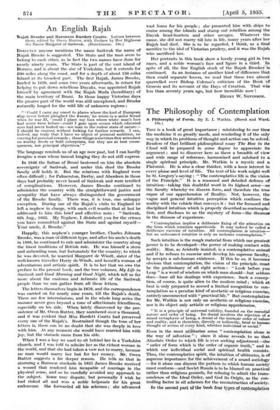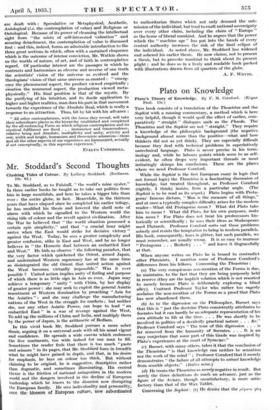The Philosophy of Contemplation Tins is a book of great
importance ; ministering to our time the medicine it so greatly needs, and reminding it of the only way in which its problems of thought and action can be solved. Readers of that brilliant philosophical essay The Bow in the Cloud will be prepared in some degree to appreciate its argument ; and to discover here as there a breadth of view and wide range of reference, harmonized and subdued to a single spiritual principle. Mr. Watkin is a mystic and a Platonist. He is also a clear thinker, with a keen interest in every phase and level of life. The text of his work might well be St. Gregory's saying. : "The contemplative life is the vision of the Principle." It is a reasoned and detailed defence of intuition—taking this doubtful word in its highest sense--as the faculty whereby we discern form, and therefore the true'
organ of our apprehension of Reality. Not, however, the vague and genera/ intuitive perception which confuses the reality with the vehicle that conveys it : but the focussed and disciplined intuition which is properly described as contemplal
tion, and discloses to us the mystery of form—the thusness in the thisness of experience.
"Contemplation implies a deliberate fixing of the attention on the form which intuition apprehends. It may indeed be called a deliberate exercise of intuition. All contemplation is intuition— but an unfocussed intuition is only an inchoate contemplation."
Such intuition is the rough material from which our greatest: power is to be developed—the power of making contact with reality. Man, as Aristotle insisted, is a contemplative animal' and if he refuses to exercise and develop his supreme faculty,' he accepts a sub-human existence. If this be so, it becomes obvious that contemplation, the vision of the principle, must be the preliminary of all right action : "Look before you Leap " is a word of wisdom on which man should—but seldom does—base all his dealings with experience. Such a concep- tion, of course, is quite alien to the modern mind ; which at best is only prepared to accord a limited recognition to con- templation as a peculiar kind of aesthetic or religious exercise, entirely unconnected with "practical life." But contemplation for Mr. Watkin is not only an aesthetic or religious exercise,.
nor is its object only artistic or religious apprehension. '
"It is a principle of universal validity, founded on the essential nature and order of being. Its denial involves the rejection of a sound metaphysic of being, a denial of the intrinsic order of values and reality, and is therefore, directly or indirectly, fatal to human thought or action of every kind, whether individual or social."
Even in the most utilitarian sense "contemplation alone is the way of salvation " ; since it alone reveals to us that
Absolute Order to which life is ever seeking adjustment--the "order of form which is the order of organic truth," and in which our individual. social and spiritual health consists. Thus, the contemplative spirit, the intuition of ultimates, is of supreme importance for the achievement of a sound sociology
—for it alone can discern the pattern to which human society must conform—and Soviet Russia is to be blamed on practical rather than religious grounds, for refusing to admit the trans- cendence of the Ideal Order, and God its Origin, as the con-
trolling factor in all schemes for the reconstruction of society. In the second part of the book four types of contemplation are dealt with : Speculative or Metaphysical, Aesthetic, Axiological (i.e. the contemplation of value) and Religious or
Ontological Because of its power of cleansing the intellectual sight from "the mists of self-interested valuation" and securing detachment, the contemplation of value is discussed first : and this, indeed, forms an admirable introduction to the three great sections in which, often with a sustained eloquence which is the outcome of intense conviction, Mr. Watkin shows us the worlds of nature, of art, and of faith in contemplative regard. Of particular interest are the passages in which he contrasts and harmonizes as obverse and reverse of one truth the scientists' vision of the universe as evolved and the theologians' vision of that same universe as created : "emerg- ence the phenomenal aspect, the product viewed empirically ; creation the noumenal aspect,. the production viewed meta- physically." His final position is that of the mystic. By the purifying of his intuition, and its docile application to higher and higher realities, man does his part in that movement towards the experience of the Absolute Real, which is really a response to an attraction. Thus, bit by bit with his advance :
" All other. contemplations, with the forms they reveal, will take their subordinate places in the hierarchy established and completed by the all-embracing Form on which religious contemplation and its mystical fulfilment are fixed . . . immanence and transcendence, relative being and Absolute, multiplicity and-unity, activity and rest, width. and height, humanism and theocentric adoration—these andall the other aspects of our experience are harmonized, actually if not conceptually, in this supreme experience."
EVELYN UNDERHILL.











































 Previous page
Previous page